|
|
TODAY.AZ / Politics
President: IDPs to return to Shusha, Zangilan in 2021-22 [UPDATE]
24 September 2021 [12:35] - TODAY.AZ
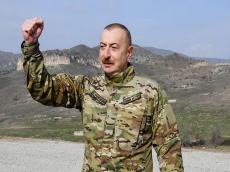
By Azernews
By Ayya Lmahamad
President Ilham Aliyev has said that IDPs will be able to return to liberated Shusha and Zandilan in 2021-22, Azertag reported on September 24.
He made the remarks in an interview with Igor Korotchenko, a famous military expert and editor-in-chief of Russia's influential National Defence magazine.
“In Shusha, I recently laid a new housing complex for 25 houses. I think they will be built within a year, a maximum of one and a half years, and we will already be able to return people to Shusha,” the president noted.
Aliyev declined to give a specific date for the return of IDPs to Zangilan, however, he added: "I think - I actually don’t think but I know this for sure – that first people will move into Zangilan next year, perhaps even by the end of this year. As for other villages, it is also possible during the year,” he said.
He noted that master plans for Aghdam and Shusha cities have been approved, and Aghdam has already started to be restored.
He stressed that there are such targeted projects as “smart village” in Zangilan region.
"Now we will carry out one pilot project in each other district so that we can already start returning people," Aliyev said.
Restoration of liberated lands
Aliyev stated that $1.3 billion were allocated only for the restoration program of the liberated territories this year.
“Of which, I would say, that about $400 million has not been allocated yet, because we comply with all the bidding, planning and design procedures,” he said.
Aliyev noted that the large-scale reconstruction is currently underway on the liberated territories and that those lands will be supplied with power by late 2021.
He stated that 20MW hydroelectric power stations in Lachin, Kalbajar and Sugovushan had already been restored, and several substations have been built.
The president highlighted that roads are being built in all directions - the Victory Road to Shusha, the second highway Fuzuli-Shusha, roads to the Armenian border at Zangilan, Gubadli, tunnels from Goygol to Kalbajar, the road from Fuzuli to Aghdam, from Fuzuli to Hadrut, to Jabyaril.
He described minefields as the biggest problem during the restoration. Aliyev stressed that the mine maps that Armenia had submitted to Azerbaijan are reliable for about 25 percent.
“But they won’t give us most of the maps of minefields, so this is a very time-consuming job. It cannot be done quickly. No matter how much money you have, it takes time,” Aliyev said.
The president added that restoration is a very complex job, not only in terms of construction but logistics, providing jobs, means of subsistence, land plots, equipment, etc.
“This is a very large amount of work that we are doing ourselves and at our own expense. We did not apply for any loans, and if anyone wants to help, of course, we will be glad. If not, this is what we must do ourselves,” he added.
Shusha operation
Speaking about the main stages of the operation, which ended in victory, the president stated that the Shusha operation was the crown of the country’s victory.
“Anyone going to Shusha along the Victory Road now can see where we accessed the city. It was a mobilization of incredible physical and moral effort. Moreover, this involved long days in the forest, in off-road conditions and with light weapons, moving forward tirelessly and then liberating Shusha - this is an unparalleled feat, this is heroism,” he stated.
Trilateral statement
Speaking about the situation ahead of signing the trilateral statement in November 2020, Aliyev said that Azerbaijan was in regular contact with the Russian president at different stages of the hostilities. He detailed the discussions held on ways how to stop the war. The president added that his proposals were supported by Russia, but rejected by Armenia.
“After we had liberated the city of Shusha, Vladimir Vladimirovich called me and said that the Armenian side was ready to do what it was supposed to do... And on 9 November, we agreed to talk again because Vladimir Vladimirovich played a very active role as if conveying my messages to [Armenian Prime Minister Nikol] Pashinyan and his messages to me. This lasted from the early morning of 9 November until late at night. And, of course, there were a lot of issues that needed to be agreed upon. All this was happening in an emergency mode. Imagine that we had to agree on a text between two warring countries in a matter of one day, and, of course, this text had to take into account the realities,” the president stated.
Armenia’s propaganda
Speaking about the interest in the conflict in the world media, Aliyev underlined that for decades, Armenian propaganda and diaspora organizations had been creating a false picture of the conflict. He noted that if looking at the outbreak of hostilities and the decision that were made by some countries, they simply defy any logic.
“Just imagine - Zangilan, Gubadli, Lachin and Kalbajar districts are occupied. And this is described as a blockade of Armenia. In other words, I mean that diaspora organizations and also the media controlled by the Armenian lobby distorted the essence of the conflict,” Aliyev stressed.
“The fact that Armenia is an aggressor, an occupier which committed ethnic cleansing and an act of genocide in Khojaly, destroyed all historical and cultural buildings – all this was concealed. And we were portrayed as some kind of a monster, as a totalitarian and authoritarian country,” he added.
Prospects for South Caucasus
Asked about prospects for the situation in the South Caucasus, Aliyev said Azerbaijan is ready to begin the process of delimitating its state border with Armenia.
“We are ready to start work on a peace treaty between Armenia and Azerbaijan. Because it is necessary. The war is over, the Nagorno-Karabakh conflict has been consigned to forever. Therefore, it is necessary to arrange normal interaction,” he said.
He noted that the initiatives discussed with regional are also aimed at positive cooperation.
“You know that there is a 3+3 initiative, which is supported by Russia, Iran, Turkey, Azerbaijan. Georgia has an objection, while Armenia has not expressed its position. Neither yes nor no. Again, there is no position. And if this is a positive position, then we can start working in this direction,” the president noted.
Aliyev emphasized that this initiative will serve not only for stabilizing and minimizing regional security risks but will also contribute to the regional countries' efforts to determine their interaction themselves and decide how they will live themselves.
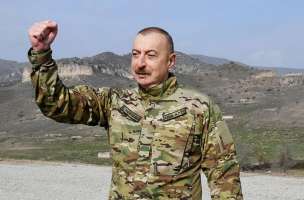
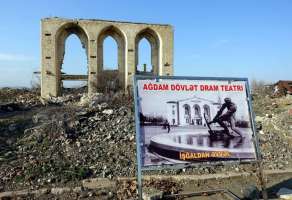
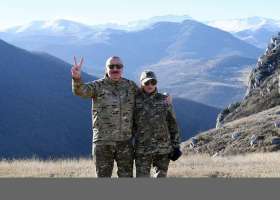
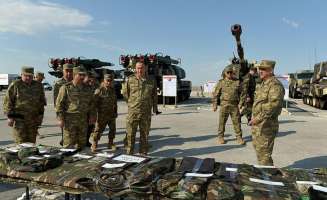
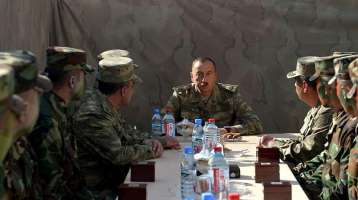
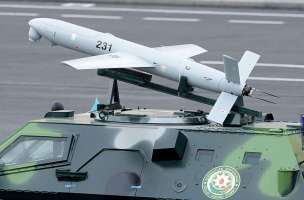
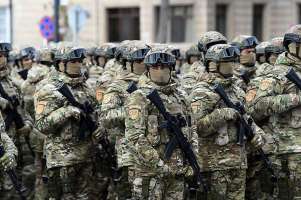
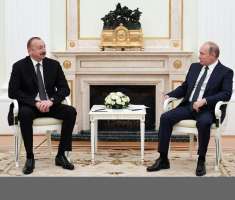
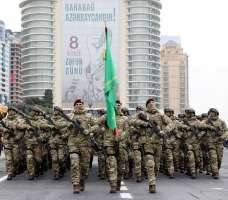
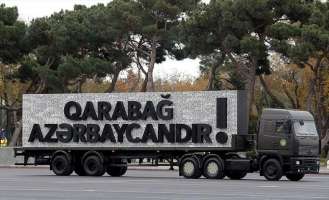
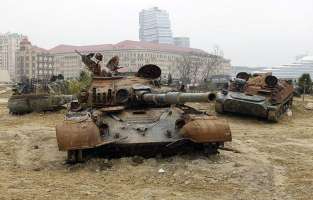
URL: http://www.today.az/news/politics/210283.html
 Print version
Print version
Connect with us. Get latest news and updates.
See Also
- 25 April 2024 [17:50]
Mass grave discovered in liberated Khojaly - 25 April 2024 [17:00]
President of Kyrgyzstan Sadyr Zhaparov concludes his state visit to Azerbaijan [PHOTOS] - 25 April 2024 [16:42]
Presidents of Azerbaijan and Kyrgyzstan have joint dinner - 25 April 2024 [16:39]
Chairs of Foreign Affairs Committee from Turkic State Parliaments scheduled to visit Garabagh - 25 April 2024 [15:45]
Azerbaijan, US discuss implementation of risk-based supervision model in banks - 25 April 2024 [14:49]
We embrace the diplomatic restoration of four villages in Gazakh: Fuat Oktay - 25 April 2024 [13:59]
Presidents Ilham Aliyev, Sadyr Zhaparov tour Shahbulag Castle in Aghdam [PHOTOS] - 25 April 2024 [13:45]
Azerbaijan Army conducts command-staff exercises - 25 April 2024 [13:35]
Presidents of Azerbaijan, Kyrgyzstan attend ground-breaking ceremony for secondary school in Aghdam [PHOTOS] - 25 April 2024 [13:30]
Presidents of Azerbaijan and Kyrgyzstan visit Aghdam Conference Center [PHOTOS]
Most Popular
 Georgian PM: longest tunnel project “historic moment” for domestic road infrastructure
Georgian PM: longest tunnel project “historic moment” for domestic road infrastructure
 China's used vehicle sales up 7.62 pct in Q1
China's used vehicle sales up 7.62 pct in Q1
 Documents in commercial & economic sector to be inked during Kyrgyz President's visit to Baku
Documents in commercial & economic sector to be inked during Kyrgyz President's visit to Baku
 Azerbaijan eliminates double taxation on income based on agreement with Turkiye
Azerbaijan eliminates double taxation on income based on agreement with Turkiye
 Türkiye hosts inaugural event on ocean action, climate crisis
Türkiye hosts inaugural event on ocean action, climate crisis
 AvtoVAZ may return to Uzbekistan market
AvtoVAZ may return to Uzbekistan market
 Uzbekistan sees sharp decline in energy resource production in Q1 2024
Uzbekistan sees sharp decline in energy resource production in Q1 2024
